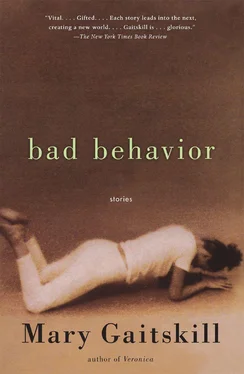“And what about you? What do you do when you’re not at this place?”
She grimaced. “Well, I don’t know if I do anything. I’m trying to become a writer. That’s why I came to New York.” She paused, wondering if that sounded ridiculous to this man who wore suits and patronized prostitutes. “Do you think that’s stupid?”
“No, not at all. Why would I think it’s stupid?”
“Because so many girls in these houses have the desire to do something else, but it’s obvious that in most cases they don’t have any talent or are too scared, and I don’t know, it just seems sort of pathetic to me. I don’t even tell people here what I do. I say I’m a secretary or a dental technical or something.”
“But that’s silly. As it happens, I know there have been some very talented people working here. There was a whole coterie of various artists at one point. One of them was a performance artist who went off to Italy and started working with, oh, some avant-garde choreographer — I know the name but I can’t think of it. Anyway, I hear she’s doing fine.”
“How do you know?”
“I was a regular of hers, and we saw each other on the outside. She had short hair like yours, only hers was orange.” He smiled, as though this disclosed a revealing element that firmly established a relationship between Stephanie and the orange-haired girl. “As a matter of fact, she used this place to collect material for her work. She was extremely bright and very aware of all the contradictions she embodied by being here.” He smiled gently. “She could talk about it endlessly.”
She pulled off her skirt and lay down next to him, supporting herself on one elbow. They talked about fiction in The New Yorker and The Atlantic . She ranted against the trendy writers she despised. They talked about dance performances they’d seen. He described a piece at the Dance Theater Workshop in which the dancers waved large Styrofoam animals at each other and rolled around in paint. She thought it sounded idiotic, but felt tender toward his robustly curious delight in this goofy spectacle.
“I have a Workshop membership and every now and then I get invited to fabulous parties, where all the boys wear long coats and earrings, and all the girls have hair like yours.” He beamed.
She thought: At this rate, I’m not going to have to do anything.
They talked about her past, her coldly perfect father, her sad, passive mother, her sister on lithium, her college major, her first romance. He listened gravely. He began to stroke her arm hairs, and then her arm.
He had a seductive touch; she moved closer to him and he put his arms around her. He caressed her as if he were trying to discover the places she most inhabited — not romantically, but tenderly, with a sense of exploration. She was not aroused, exactly, but it was pleasant; it had been a long time since anyone had touched her like this.
She murmured, “The way you touch reminds me of my mother.”
“How so?”
“Her touch is very seductive. I don’t even like her, but when she starts to touch me, I suddenly become totally vulnerable to her. It’s frightening.”
He liked this a lot. “That’s beautiful,” he said.
The intercom buzzed, announcing that they had ten more minutes. She “took care of him” quickly, and they stood to dress. She stuck her feet back in her high heels, and cheerfully tore the sheets off the bed. He zipped up his pants, handed her an extra twenty and told her it had been a relaxing hour. She said yes, actually, it had been for her too, and then trotted off to stuff the wadded-up sheets in a reeking wicker basket. She walked him downstairs, feeling ungainly and knees-out in her tight skirt. She was aware of him looming and lurking darkly behind her as she came under the speculative, moody gaze of three potential Romeos.
“And here’s Perry,” said Christine brightly.
“Hi,” she said, bobbing her head. She turned to Bernard and rolled her eyes as she walked him to the door, knowing that he would enjoy this open display of contempt.
“See you soon,” he said. He held her against him for a second, and she experienced a disorienting sense of comfort and safety that made walking back into the invading stares of her prospective boyfriends almost voluptuously exposing. She stood before them, and the canned laughter sounded once more.
That night she went to a group show at a small gallery in Soho that included work by her friend Sandra. As usual, she was one of the few non-artists there. Sandra, nervous and carefully chic in a bright blue pillbox hat and a long black velvet skirt, introduced her as “my friend Stephanie, who writes for The Village Voice .” This impressed people, even when Stephanie said, “I just wrote one thing for the Voice and that was a year and a half ago.”
“Yes, but you look like a writer for The Village Voice ,” said a painter.
“That sounds like an insult to me.”
“It’s not an insult, but it’s not a compliment either.” He barked out a laugh.
Stephanie attached herself to another conversation about the embarrassing failure of an art gallery that she had never heard of, which, after a rapid shift of participants, became a discussion about somebody’s review in the Times versus somebody’s review in the Voice . Sandra rapidly crossed and recrossed the floor, darting in and out of conversations with apparent pleasure and animation. “Nobody’s here ,” she hissed finally, near the hors d’oeuvres, even though there were dozens of people present.
Stephanie wandered from conversation to conversation, having an almost panicky feeling that although there were nice, interesting people in the room, the situation, for all its seeming friendliness and ease, precluded her from connecting with the nice and interesting aspects of them. She tried to figure out why this was and could not, beyond the sense that the conversations around her were opening and closing according to the subtle but definite rules that no one had told her about. Then she saw Dara, Sandra’s other non-artist friend, standing regally alone. Dara was trying to become a fashion designer, and she looked unusually beautiful that night in a strapless satin dress that was dramatically faded in the middle where someone had probably spilled something on it a long time ago. Stephanie had always admired Dara, even though she was not friendly and had once been very rude to Stephanie on the phone. But Dara seemed pleased to see her and hung on to her presence throughout a shockingly dull conversation that stumbled awkwardly through Sandra’s work, Sandra’s husband’s work, a writer Stephanie liked and a movie. Still, Stephanie resolutely held on to her idea of Dara as an interesting person. She said, “You seem like someone who is at home in the world.”
A startled look flared in Dara’s eyes; she glanced at Stephanie with disappointment. “Nothing could be further from the truth,” she said shortly. “I doubt you know anyone less at home than me.”
They stood silently, Stephanie’s silence a disheartened one. She had thought she was making a penetrating remark that would impress Dara with her perceptiveness; instead she had revealed herself to be a person living in a dreamworld. This was always happening.
The next day at Christine’s, she felt like a person in a dreamworld, specifically a Playboy cartoon dreamworld inhabited by beautiful, moronic prostitutes in short pink negligees lolling about on cushions with white cats while large men in suits smiled at them. It was a strangely pleasant sensation. It had been a slow afternoon, and the women lounged on the couch with their high heels off and their feet up, watching TV and eating heavily salted french fries from damp carry-out containers.
Читать дальше












